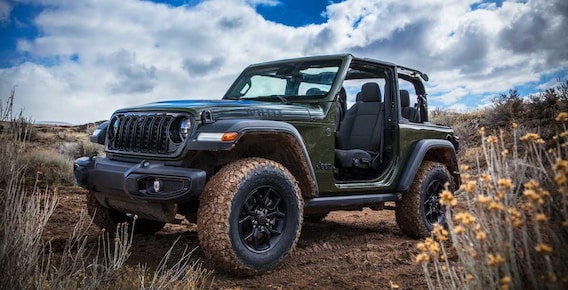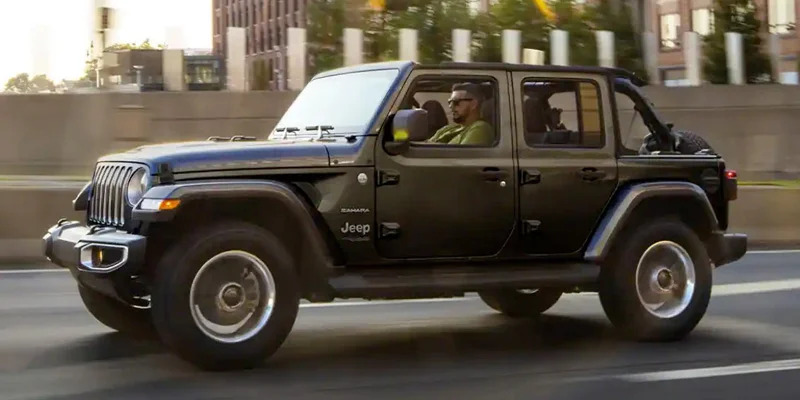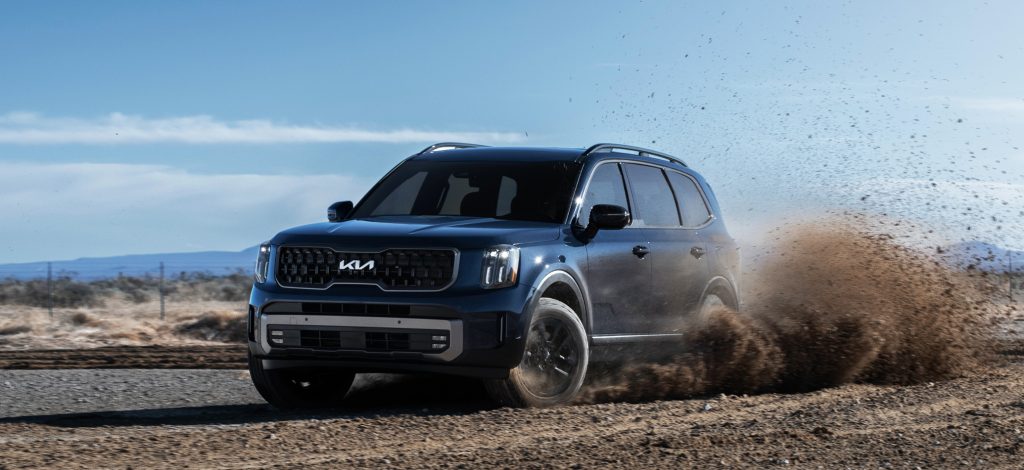Off-road vehicles should offer robust suspension and durable tires. Ground clearance and 4WD capabilities are essential.
Selecting the ideal off-road vehicle requires a blend of features designed to tackle rugged terrain. Key elements include a sturdy chassis, a powerful engine, and advanced traction control systems. Enthusiasts often prioritize a vehicle’s ability to navigate obstacles, which is where good ground clearance and a solid suspension system come into play.
All-wheel drive (AWD) or four-wheel drive (4WD) is also critical for maintaining grip in various off-road conditions. Durability is a must, as these vehicles often face harsh environments that can take a toll on less rugged cars. Maneuverability and visibility are equally important, as drivers need to make quick decisions and spot potential hazards on uneven trails. Lastly, a vehicle that offers a balance of comfort and utility ensures that the journey is as enjoyable as the destination.

Credit: www.falveys.com
Introduction To Off-road Adventure
Embrace the excitement of off-road adventure where every turn brings a new challenge. Exploring the untamed trails requires a vehicle that’s robust, versatile, and equipped with the right features. Whether it’s a rocky terrain or a muddy path, the right off-road vehicle will take you through with ease.
The Thrill Of The Unpaved Path
Unpaved paths offer endless adventure and the chance to experience the raw beauty of nature. The thrill of conquering tough terrains is unmatched. It’s about the roar of the engine, the grip of the tires, and the vehicle’s power to overcome obstacles.
Essentials For Off-road Readiness
- Durable Tires: Look for thick, deep treads to navigate through rough terrains.
- Powerful Engine: A robust engine ensures your vehicle won’t back down from a challenge.
- High Ground Clearance: Avoid getting stuck with ample space between your vehicle and the ground.
- Sturdy Suspension: A flexible suspension system absorbs shocks and keeps the ride smooth.
- 4WD Capability: Four-wheel drive provides the needed traction and control.
Engine Power And Performance
Choosing the right off-road vehicle means looking under the hood. The engine’s power and performance are vital. These features decide how well your vehicle will conquer challenging terrains. Let’s explore the key aspects.
Torque Over Horsepower
Off-road adventures demand torque more than sheer horsepower. Torque is the force that helps your vehicle climb hills and power through difficult surfaces. High torque at low RPMs ensures better control and handling on steep or uneven ground.
- Low-end torque for crawling over rocks
- Consistent power delivery across various terrains
- Key for pulling and towing capabilities
Engine Types Suitable For Rough Terrains
Different engines offer unique benefits for off-road conditions. Diesel engines provide higher torque at lower RPMs. They are preferred for heavy-duty challenges. Petrol engines are lighter and offer quick acceleration. Hybrid engines combine power with efficiency.
| Engine Type | Torque | Efficiency | Weight |
|---|---|---|---|
| Diesel | High | Good | Heavy |
| Petrol | Medium | Varied | Light |
| Hybrid | High | Excellent | Medium |
Durable And Robust Chassis
A strong chassis forms the backbone of any off-road vehicle. It withstands rough terrains and heavy loads. Let’s dive into what makes a chassis truly off-road worthy.
Frame Strength And Flexibility
The frame of an off-road vehicle must be strong yet flexible. This balance allows the vehicle to navigate uneven landscapes without breaking.
- High-quality materials like steel or aluminum are key.
- Look for a reinforced structure that supports the vehicle’s weight.
- Flexibility helps absorb shocks and prevent damage.
Impact Resistance Considerations
Off-road vehicles face hits and bumps. A durable chassis must resist these impacts.
| Feature | Benefit |
|---|---|
| Skid plates | Protects underside from rocks and debris. |
| Side bars | Shields against side impacts. |
| Bumpers | Absorbs force from front and rear collisions. |
Ensure that the chassis has tested impact resistance. This keeps the vehicle and passengers safe.
Suspension Systems For Tough Roads
Conquering rough terrains demands a robust suspension system. This system is the heart of any off-road vehicle, absorbing bumps and providing stability. Let’s dive into the key features that make suspensions capable of handling tough roads.
Types Of Off-road Suspensions
Different terrains require different suspension types. Each type has unique benefits for off-road performance.
- Independent Suspension: Wheels move independently, offering better ride comfort.
- Solid Axle Suspension: Known for durability and strength, ideal for rocky paths.
- Multi-link Suspension: Provides flexibility and articulation, perfect for uneven ground.
- Coilover Suspension: Allows for adjustability and precision, suited for diverse terrains.
Importance Of Articulation And Travel
Articulation and travel are vital for maintaining tire contact on uneven surfaces.
| Term | Definition |
|---|---|
| Articulation | The ability of suspension parts to move independently. |
| Travel | How much the wheel can move up and down. |
Good articulation ensures that all wheels can adjust to the terrain. Adequate travel prevents the vehicle’s underside from hitting the ground. Together, they enable off-road vehicles to tackle extreme landscapes with ease.
Drive Systems And Traction Control
Drive Systems and Traction Control are crucial in off-road vehicles. They determine how well a vehicle can handle tough terrain. The right system provides the grip and power needed to tackle any challenge. Let’s explore the key features that make off-road driving a breeze.
4wd Vs Awd: Which Is Superior?
Four-Wheel Drive (4WD) and All-Wheel Drive (AWD) are different. Both send power to all four wheels. This improves traction on rough surfaces. Yet, they work in distinct ways.
- 4WD is great for extreme off-road situations. It’s usually found in trucks and SUVs.
- AWD offers consistent power to all wheels. It’s common in crossovers and cars.
For rugged landscapes, 4WD often outshines AWD. It gives drivers the ability to handle steep, uneven, and slippery conditions better.
Locking Differentials And Traction Aids
Locking differentials are a game-changer in off-road vehicles. They ensure that wheels spin at the same speed. This boosts traction when it’s needed most.
Traction aids include features like Traction Control Systems (TCS) and Electronic Stability Programs (ESP). They prevent wheels from slipping on slick surfaces.
| Feature | Benefit |
|---|---|
| Locking Differentials | Equal power to all wheels, better grip |
| Traction Control Systems | Prevents wheel spin, improves control |
With these systems, off-road drivers can face mud, rocks, and sand with confidence. They help keep the adventure going no matter what.
Tire Selection For Diverse Terrains
Choosing the right tires for an off-road vehicle is crucial. Tires are the only contact between the vehicle and the terrain. They must handle a variety of surfaces. Let’s dive into the key tire features for off-road adventures.
Tread Patterns For Grip And Stability
The right tread pattern provides grip and stability on rough terrains. Look for deep grooves and large lugs on the tire. These features help in muddy and rocky conditions.
- Deep grooves channel water and mud away from the tire.
- Large lugs bite into the terrain for better traction.
- Varied tread blocks improve grip on uneven surfaces.
Tire Durability And Puncture Resistance
Durable tires withstand harsh conditions without punctures. High-quality materials make tires tough against obstacles.
| Feature | Benefit |
|---|---|
| Reinforced sidewalls | Prevent cuts and punctures |
| Thick treads | Resist sharp rocks |
| Strong rubber compounds | Extend tire life |
Choose tires with these features for safe and enjoyable off-road experiences. Your adventures depend on strong, reliable tires.
Ground Clearance And Protection
Conquering rough terrain demands an off-road vehicle with the right features. Ground clearance and protection are crucial. They keep the vehicle safe from rocks and debris. Let’s explore what to consider.
Height Matters: Avoiding Obstacles
High ground clearance allows a vehicle to glide over obstacles. Rocks and logs won’t touch the undercarriage. This prevents damage and maintains performance.
- Look for at least 10 inches of clearance for moderate off-roading.
- Extreme terrains require more clearance, so aim higher.
Skid Plates And Protective Accessories
Skid plates are the shield of an off-road vehicle. They protect vital parts underneath.
| Part Protected | Material | Importance |
|---|---|---|
| Engine | Steel or Aluminum | Essential |
| Fuel Tank | Steel or Aluminum | High |
| Transfer Case | Steel or Aluminum | High |
Other protective accessories include:
- Rock sliders: Protect the sides.
- Bull bars: Guard the front end.

Credit: www.adamsjeepofmaryland.com
Water Fording And Sealing
Thrill-seekers and adventure lovers know that a good off-road vehicle must conquer wet and wild terrain. The ‘Water Fording and Sealing’ features of a vehicle determine its ability to tackle water obstacles without damaging its internal components. Let’s dive into what makes an off-road vehicle truly water-ready.
Understanding Depth Ratings
Depth ratings are a critical spec for off-roaders. These numbers tell you how deep a vehicle can go into water without risking damage. Manufacturers test vehicles thoroughly to provide a safe water fording capability. Always check your vehicle’s manual for its specific rating and stick to it to avoid costly repairs.
Seals And Snorkels For Engine Safety
To keep your engine safe, proper sealing and snorkels are non-negotiable. Seals protect electrical components and prevent water from entering the engine bay. A snorkel extends the engine’s air intake to a higher point on the vehicle. This ensures clean, dry air is available even when navigating through high water levels. Below is a list of crucial sealing points and snorkel benefits:
- Door seals – Keep the cabin dry
- Engine seals – Protect vital engine parts
- Transmission seals – Maintain gearbox integrity
- Differential seals – Ensure axle and gears are secure
| Snorkel Benefit | Description |
|---|---|
| Higher Air Intake | Reduces water and dust ingestion |
| Cooler Air | Improves engine performance |
| Engine Longevity | Extends engine life by using cleaner air |
Remember, even with the best sealing and a snorkel, always approach water crossings with caution and knowledge of your vehicle’s limits. Respect the depth ratings and equip your off-road warrior with the right seals and snorkels for a safe and exciting adventure.
Electronics And Navigation Tools
Electronics and Navigation Tools are vital for any off-road adventure. They guide drivers through unknown terrains. Modern vehicles offer high-tech solutions for navigation and safety. Let’s explore the essential electronics that keep you on track and in touch, even off the beaten path.
Off-road Gps And Communication Systems
GPS devices designed for off-roading have robust features. They withstand tough conditions. These systems provide detailed maps, even where cell service fails. They also offer:
- Topographic data
- Trail tracking
- Waypoint marking
Communication systems are key. They keep you connected. Consider these options:
- Satellite messengers for SOS alerts
- Two-way radios for group travel
- CB radios for wider communication
Advanced Driver Assistance Features
These features support and enhance the driving experience. They help drivers navigate difficult terrains. Look for:
- Hill descent control
- Terrain management systems
- 360-degree cameras
Driver assistance includes electronic aids. They prevent accidents. They also ensure a safer off-road experience.
| Feature | Benefit |
|---|---|
| Blind Spot Monitoring | Detects unseen obstacles |
| Adaptive Cruise Control | Maintains safe distance |
| Lane Keeping Assist | Helps stay in lane |
Recovery Gear And Emergency Kits
Recovery gear and emergency kits are vital for any off-road adventure. These tools and supplies ensure you can tackle tough situations. Being prepared is not just a choice, it’s a necessity for safety and peace of mind.
Must-have Tools For Self-rescue
When off-roading, getting stuck is a matter of when, not if. Must-have tools can turn a dire situation around. Here’s what to pack:
- Winch: A powerful tool for pulling your vehicle out.
- Traction mats: These help your tires grip and escape ruts.
- Shovel: Essential for digging out tires or building ramps.
- Snatch straps: Useful for when another vehicle lends a pull.
- High-lift jack: For lifting your vehicle in soft terrain.
Preparing For The Unexpected
Emergency kits should include items for various scenarios. Here’s what your kit needs:
| Item | Use |
|---|---|
| First Aid Kit | For medical emergencies |
| Flashlight and Batteries | For visibility at night |
| Fire Extinguisher | To put out small fires |
| Multi-Tool | For various quick fixes |
| Emergency Blanket | To keep warm in cold weather |
Pack these items to stay prepared for any emergency off the beaten path.
Customization And Upgrade Options
Customizing an off-road vehicle is not just about looks; it’s about performance and functionality. The right upgrades can transform a standard vehicle into a tailored off-road powerhouse. Whether it’s for handling rough terrain or personal style, the options are vast.
Personalizing Your Off-road Experience
Your off-road vehicle should reflect your personal needs and style. Personalizing your ride is not only fun but practical. Options range from performance tweaks to cosmetic enhancements. Always choose modifications that suit your off-road adventures.
- Skid plates: Protect your undercarriage from rough terrain.
- Winches: A must-have for self-recovery situations.
- Lift kits: Increase ground clearance for challenging trails.
- Custom paint or wraps: Stand out with a unique design.
Aftermarket Upgrades Worth Considering
Investing in aftermarket upgrades can boost your vehicle’s off-road capabilities. Quality parts make a significant difference in performance. Consider these top upgrades:
| Upgrade | Benefit |
|---|---|
| Tires | Improved traction on various terrains. |
| Suspension | Better ride quality and durability. |
| Lighting | Enhanced visibility for night trails. |
| Snorkel | Allows for water crossings and better engine breathing. |
Choose wisely, as the right modifications can make every journey unforgettable.

Credit: www.crownchryslerdublin.com
Conclusion: Ready To Conquer The Wild
Embarking on off-road adventures requires a vehicle tailored to the challenge. Features like 4WD, high ground clearance, and robust tires are key. This guide will help you pick the perfect off-road companion.
Choosing The Right Vehicle For Adventure
Off-road prowess starts with the right vehicle. Seek one with powerful 4WD and lockable differentials. This ensures traction in tough terrains. High ground clearance and skid plates protect against rocks and debris. Consider a model with ample cargo space for gear.
The Responsible Off-roader’s Checklist
- Prepare with the essentials: Map, compass, and a first-aid kit are must-haves.
- Respect the environment: Stick to trails to preserve the wild.
- Stay informed: Weather changes can be sudden. Know the forecast.
- Maintain your vehicle: Regular checks will keep it adventure-ready.
With the right vehicle and responsible practices, off-road adventures await. Choose wisely and tread lightly!
Frequently Asked Questions
How To Choose An Offroad Vehicle?
Assess your off-road needs and budget first. Choose a vehicle with 4WD, high ground clearance, and durable suspension. Research reliability and aftermarket support. Consider fuel efficiency and storage capacity. Test drive to ensure comfort and handling meet expectations.
What Makes A Successful All-terrain Vehicle?
A successful all-terrain vehicle boasts robust durability, powerful performance, versatile handling, advanced suspension systems, and high ground clearance for diverse terrains.
What Does An Off-road Vehicle Need?
An off-road vehicle requires robust suspension, durable tires, high ground clearance, a powerful engine, and 4-wheel drive for rugged terrain navigation.
What Is A Good Ground Clearance For Off-road?
A good ground clearance for off-road vehicles is typically between 8. 8 to 10. 8 inches, ensuring obstacle navigation without undercarriage damage.
Conclusion
Selecting the right off-road vehicle is crucial for any adventure enthusiast. Prioritize robust suspension, durable tires, and a strong engine. Remember, comfort and navigation tech also enhance your journey. Choose wisely, and your off-road experiences will be unforgettable. Embark on your next adventure with confidence in your vehicle’s capabilities.

